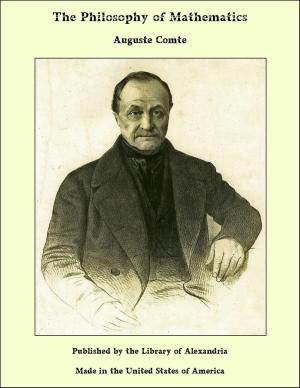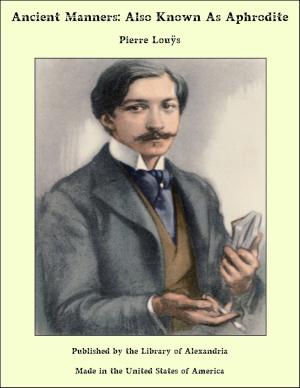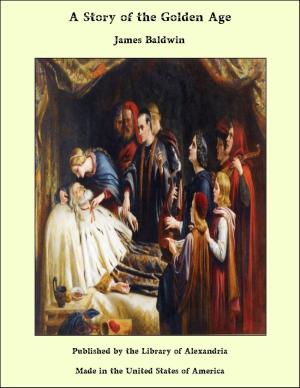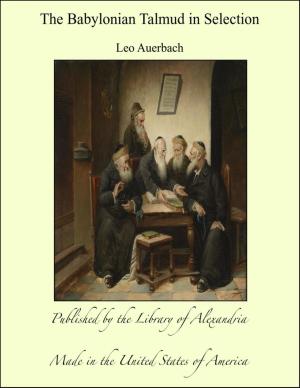The Works of Dionysius the Areopagite
Nonfiction, Religion & Spirituality, New Age, History, Fiction & Literature| Author: | John Parker | ISBN: | 9781465579317 |
| Publisher: | Library of Alexandria | Publication: | March 8, 2015 |
| Imprint: | Language: | English |
| Author: | John Parker |
| ISBN: | 9781465579317 |
| Publisher: | Library of Alexandria |
| Publication: | March 8, 2015 |
| Imprint: | |
| Language: | English |
THE Treatise on "Divine Names" was written by Dionysius, at therequest of Timothy, and at the instigation of Hierotheus, to express, in a formmore easily understood, the more abstract Treatise of Hierotheus, who was his chiefinstructor after St. Paul. Its purpose is to explain the epithets in Holy Scriptureapplied alike to the whole Godhead--Father, Son, and Holy Ghost. It does not pretendto describe the unrevealed God, Who is beyond expression and conception, and canonly be known through that union with God, "by which we know, even as we are known."Holy Scripture is the sole authority, beyond which we must neither think nor speakof Almighty God. The Treatise, being written by one of the most learned Greeks, the phraseology is, naturally, that of Plato and Aristotle ; but Plato and Aristotleare not authorities here. When Plato treated his Hebrew instructor with such reverence, and was so versed in the Pentateuch, we need not be sensitive as to the admissionof Plato’s authority. But, as a matter of fact, on the question of Exemplars2 and some other points, the opinions of Plato are expressly refuted. The phrase ofLuther, "Platonising, rather than Christianising," proves only a very meagre acquaintance with Dionysius. The Greek language is moulded ina marvellous manner to express the newly revealed Christian Faith in its most exaltedform, in a style which Daillé confesses to be always of the same "colour;" and Pearson,"always like itself." Jahn has followed Dionysius step by step in order to tracethe connection between the language of Plato and Dionysius, for the purpose of explodingthe puerile supposition that such complex writings as these could have been evolvedfrom the elementary treatises of Proclus and Plotinus. Most probably, some of thelost writings of Dionysius are in part preserved in those writers and in Clementof Alexandria; but Dionysius is the Master, not Pupil! The works are very distinctand precise upon the Divinity of Christ, and the Hypostatic Union. Like St. Paul, Dionysius affirms that He, Who made all things, is God; and further that Jesus isGod, by some startling phraseology. He speaks of James, "the Lord’s brother3,"as "brother of God" David, from whom was born Christ after the flesh, is called"father of God4." Whenspeaking of the entombment of the Blessed Virgin, he speaks of her body as the "Life-springing"and "God-receptive body;" thus testifying that Jesus, born of a pure Virgin, isLife and God. He describes the miracles of Jesus as being, as it were, the new andGod-incarnate energy of God become Man. The newly-coined words indicate an original thinker moulding the Greek language to a newlyacquired faith. There are two words, "Agnosia" and "Divine Gloom," which illustratea principle running through these writings,--that the negative of abstraction denotesthe superlative positive. "Divine Gloom" is the darkness from excessive light; "Agnosia"is neither ignorance nor knowledge intensified: but a supra-knowledge of Him, Whois above all things known. It is "the most Divine knowledge of Almighty God, withinthe union beyond mind, when the mind, having stood apart from all existing things, and then, having dismissed itself, has been united to the superluminous rays--thenceand there, being illuminated by the unsearchable wisdom." In theMystic Theology,Dionysius exhorts Timothy thus,--"But, thou, O dear Timothy, leave behind bothsensible perception, and intellectual efforts, and all objects of sense and intelligence;and all things being and not being, and be raised aloft as far as attainable, γνστως--unknowingly5,--tothe union with Him above every essence and knowledge.
THE Treatise on "Divine Names" was written by Dionysius, at therequest of Timothy, and at the instigation of Hierotheus, to express, in a formmore easily understood, the more abstract Treatise of Hierotheus, who was his chiefinstructor after St. Paul. Its purpose is to explain the epithets in Holy Scriptureapplied alike to the whole Godhead--Father, Son, and Holy Ghost. It does not pretendto describe the unrevealed God, Who is beyond expression and conception, and canonly be known through that union with God, "by which we know, even as we are known."Holy Scripture is the sole authority, beyond which we must neither think nor speakof Almighty God. The Treatise, being written by one of the most learned Greeks, the phraseology is, naturally, that of Plato and Aristotle ; but Plato and Aristotleare not authorities here. When Plato treated his Hebrew instructor with such reverence, and was so versed in the Pentateuch, we need not be sensitive as to the admissionof Plato’s authority. But, as a matter of fact, on the question of Exemplars2 and some other points, the opinions of Plato are expressly refuted. The phrase ofLuther, "Platonising, rather than Christianising," proves only a very meagre acquaintance with Dionysius. The Greek language is moulded ina marvellous manner to express the newly revealed Christian Faith in its most exaltedform, in a style which Daillé confesses to be always of the same "colour;" and Pearson,"always like itself." Jahn has followed Dionysius step by step in order to tracethe connection between the language of Plato and Dionysius, for the purpose of explodingthe puerile supposition that such complex writings as these could have been evolvedfrom the elementary treatises of Proclus and Plotinus. Most probably, some of thelost writings of Dionysius are in part preserved in those writers and in Clementof Alexandria; but Dionysius is the Master, not Pupil! The works are very distinctand precise upon the Divinity of Christ, and the Hypostatic Union. Like St. Paul, Dionysius affirms that He, Who made all things, is God; and further that Jesus isGod, by some startling phraseology. He speaks of James, "the Lord’s brother3,"as "brother of God" David, from whom was born Christ after the flesh, is called"father of God4." Whenspeaking of the entombment of the Blessed Virgin, he speaks of her body as the "Life-springing"and "God-receptive body;" thus testifying that Jesus, born of a pure Virgin, isLife and God. He describes the miracles of Jesus as being, as it were, the new andGod-incarnate energy of God become Man. The newly-coined words indicate an original thinker moulding the Greek language to a newlyacquired faith. There are two words, "Agnosia" and "Divine Gloom," which illustratea principle running through these writings,--that the negative of abstraction denotesthe superlative positive. "Divine Gloom" is the darkness from excessive light; "Agnosia"is neither ignorance nor knowledge intensified: but a supra-knowledge of Him, Whois above all things known. It is "the most Divine knowledge of Almighty God, withinthe union beyond mind, when the mind, having stood apart from all existing things, and then, having dismissed itself, has been united to the superluminous rays--thenceand there, being illuminated by the unsearchable wisdom." In theMystic Theology,Dionysius exhorts Timothy thus,--"But, thou, O dear Timothy, leave behind bothsensible perception, and intellectual efforts, and all objects of sense and intelligence;and all things being and not being, and be raised aloft as far as attainable, γνστως--unknowingly5,--tothe union with Him above every essence and knowledge.















